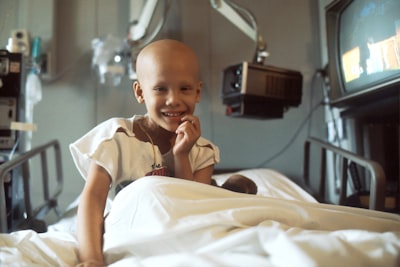Pediatric Cancer Awareness: Join the Fight for a Cure
Pediatric cancer is a devastating diagnosis that no child or family should have to face. It is a disease that affects thousands of children each year and can have a profound impact on their lives. In this blog, we aim to provide a comprehensive understanding of pediatric cancer, including the types of cancer that commonly affect children, how it is diagnosed and treated, and the challenges faced by young patients and their families. We will also discuss the critical role of research in combating pediatric cancer, as well as advocacy and support for those affected by this disease.
Finally, we will explore ways in which we can raise awareness about pediatric cancer and inspire hope for those who are fighting this battle. Join us in uniting against pediatric cancer and making a difference in the lives of children around the world.
Understanding Pediatric Cancer
Childhood cancer profoundly affects young patients and their families. Pediatric oncology, a specialized branch of medicine, focuses on treating cancer in children. The impact of pediatric cancer on a child's overall well-being necessitates specialized care and treatment. Advancing outcomes requires research and clinical trials.
Childhood cancer can affect various parts of the body, making it the leading cause of death in children in the United States. Treatment often involves chemotherapy and radiation therapy, with survivors potentially experiencing late effects. Supportive care is crucial for managing the impact of pediatric cancer.
Types of Pediatric Cancer
Different types of cancer can occur in children, including leukemia, lymphoma, retinoblastoma, hepatoblastoma, pediatric sarcomas, and brain tumors. Understanding the specific type is crucial for effective treatment.
Leukemia is the most prevalent pediatric cancer, followed by lymphoma and brain tumors. Neuroblastoma primarily affects infants, while Wilms tumor is a kidney cancer found in children. These common forms of cancer in children require specialized care from pediatric oncology groups.
Rare and Uncommon Pediatric Cancers
Retinoblastoma is a rare eye cancer in young children. Osteosarcoma primarily affects adolescents. Hepatoblastoma is a rare liver cancer in young children. Ewing sarcoma primarily affects bones and soft tissues. Rhabdomyosarcoma occurs in muscles and other soft tissues.
Diagnosis and Treatment of Pediatric Cancer
Early diagnosis is vital for successful treatment. Pediatric cancer is diagnosed through various tests and procedures. Treatment includes surgery, chemotherapy, radiation therapy, targeted therapies, and immunotherapy. Multidisciplinary teams collaborate to provide comprehensive care to young patients.
How is Pediatric Cancer Diagnosed?
Diagnosing pediatric cancer involves blood tests, imaging studies, and biopsies to confirm the presence of cancer cells. Genetic testing may identify specific mutations, while bone marrow aspiration and lumbar puncture help determine the type and stage of cancer. Pediatric oncologists work closely with pathologists throughout the diagnostic process.
Chemotherapy, radiation therapy, and surgery are common treatment methods for pediatric cancer. Targeted therapies specifically target cancer cells, while immunotherapy harnesses the body's immune system to fight cancer. These treatment methods are part of a multidisciplinary approach to combating childhood cancer.
The Challenges Faced by Young Cancer Patients and Their Families
Young cancer patients may encounter physical and emotional difficulties during treatment, while families face financial burdens and emotional strain. Education and support services are vital for both. Survivors may require ongoing healthcare and monitoring. Social workers and rehabilitation specialists offer valuable assistance.
During pediatric cancer treatment, young patients may face side effects like nausea, hair loss, and fatigue. Emotional support is crucial for both patients and their families. Maintaining education can be challenging, and long-term effects can impact survivors' quality of life. Psychological support services are available to address the emotional impact.
Recent Advances and Ongoing Studies
Immunotherapy is a promising new approach to treating pediatric cancer, utilizing the power of the immune system to target cancer cells. Precision medicine is tailoring treatment plans based on a child's specific cancer type and genetic makeup. Collaborative research between hospitals and research institutions allows for the sharing of knowledge and resources, promoting advancements in pediatric cancer treatment. Supportive care focuses on improving the quality of life for patients through better pain management and mental health support. Advocacy and fundraising efforts are crucial in raising awareness and funds for pediatric cancer research and family support services.
How Can We Help Children Fighting Cancer?
There are several ways to support children fighting cancer. You can donate to reputable organizations that fund research and treatment, volunteer at hospitals or organizations working with these children, raise awareness about pediatric cancer, and offer emotional and practical support to affected families.
What Can We Do to Raise Awareness about Pediatric Cancer?
Ways to raise awareness about pediatric cancer include sharing information on social media, participating in charity events, hosting local fundraisers, and advocating for more funding. These actions can help support pediatric cancer research and make a difference in the lives of young patients.
Getting Involved: There are numerous ways to get involved in Pediatric Cancer Awareness Month. Donating to reputable organizations focused on pediatric cancer research and support, participating in fundraising events, volunteering at children's hospitals, and sharing information on social media are all meaningful ways to contribute.
Understanding the Impact
Pediatric cancer affects thousands of children and their families every year. The diagnosis brings not only physical challenges but also emotional and financial burdens that can be overwhelming. Pediatric Cancer Awareness Month aims to shed light on the reality of these young warriors and their journeys, emphasizing the importance of early detection, timely treatments, and comprehensive support.
Inspiring Hope
Amidst the challenges, the indomitable spirit and resilience of pediatric cancer patients and their families shine through.
During the challenging journey of dealing with pediatric cancer, a supportive community provides vital assistance and unity. Impact Health Sharing allows members to have the unique opportunity to encourage and pray for one another through their community platform. Walking alongside other members during the most difficult time is a priceless support system for Impact Health Sharing members.
Pediatric cancer is a devastating disease that affects both the child and their family in various ways. It is important for us to understand the nature of pediatric cancer, the challenges faced by young patients and their families, and the role of research in finding effective treatments. By advocating for better healthcare access, providing financial support, and raising awareness about pediatric cancer, we can make a difference in the lives of these brave children.
Let us unite against pediatric cancer and inspire hope for a brighter future for every child fighting this battle. Together, we can create a world where no child has to suffer from this terrible disease.





